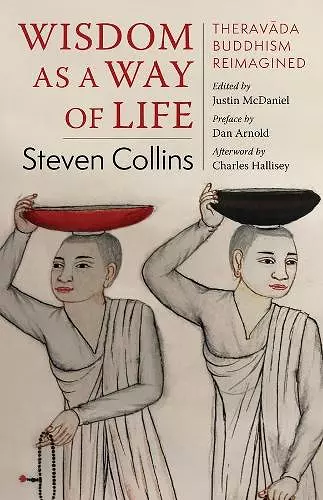Wisdom as a Way of Life
Theravāda Buddhism Reimagined
Steven Collins author Dan Arnold author Justin McDaniel editor Charles Hallisey editor
Format:Paperback
Publisher:Columbia University Press
Published:17th Jul '20
Should be back in stock very soon

This wide-ranging and powerful book argues that Theravāda Buddhism provides ways of thinking about the self that can reinvigorate the humanities and offer broader insights into how to learn and how to act. Steven Collins argues that Buddhist philosophy should be approached in the spirit of its historical teachers and visionaries, who saw themselves not as preservers of an archaic body of rules but as part of a timeless effort to understand what it means to lead a worthy life. He contends that Buddhism should be studied philosophically, literarily, and ethically using its own vocabulary and rhetorical tools. Approached in this manner, Buddhist notions of the self help us rethink contemporary ideas of self-care and the promotion of human flourishing.
Collins details the insights of Buddhist texts and practices that promote the ideal of active and engaged learning, offering an expansive and lyrical reflection on Theravāda approaches to meditation, asceticism, and physical training. He explores views of monastic life and contemplative practices as complementing and reinforcing textual learning, and argues that the Buddhist tenet that the study of philosophy and ethics involves both rigorous reading and an ascetic lifestyle has striking resonance with modern and postmodern ideas. A bold reappraisal of the history of Buddhist literature and practice, Wisdom as a Way of Life offers students and scholars across the disciplines a nuanced understanding of the significance of Buddhist ways of knowing for the world today.
Collins’ previous books have all been field-changing works. Wisdom as a Way of Life is no exception. This powerful work provides original and stimulating ways of understanding Pali texts while creating a bridge between scholars of the Pali world and intellectual historians working elsewhere. His thoughtful comparative engagement with studies of asceticism and courtly-literary culture offers much of value to scholars of South and Southeast Asia, as well as other premodern arenas. -- Anne M. Blackburn, author of Locations of Buddhism: Colonialism and Modernity in Sri Lanka
Steven Collins' last book is a gift. Providing a fresh reading on texts and stories we thought we knew, Collins makes the case that the Pali literature associated most often with Theravada Buddhism is also much more than that—it is a treasure trove of insight into the human condition and how we might meaningfully navigate it. Collins' genuine respect and appreciation for the sophisticated commentary to be found in Pali texts, combined with his signature straight talk and pull-no-punches style, makes for a provocative book that will be equally rewarding and illuminating to scholars of Buddhist texts and researchers of Buddhist practice. I am grateful to the editor and his collaborators for making this posthumous manuscript available to the rest of us and for placing its intellectual contributions in the context of Collins' other work. After reading it, I find it impossible to experience anything having to do with Theravada Buddhism—its rituals, its texts, its art—in quite the same way again. -- Nancy Eberhardt, author of Imagining the Course of Life: Self-Transformation in a Shan Buddhist Community
In his books and articles, Steve Collins asked that we approach Pali texts—narratives and systematic ones—on their own terms, and demanded that we make every effort to understand their arguments and assumptions without reducing them to our own categories. At the same time, he also required that we also recognize our shared humanity with the authors who held such different notions about the nature of the world and experience. That like ours, the cultures and societies that privileged Pali as a prestige language, were filled with laughter, anger, love, birth, and death. Wisdom as a Way of Life is a fitting realization of his vision and approach to these texts. His interpretation of the corpus of the previous lives of the Buddha is rich and incisive, and his interrogation into askesis and monasticism provides us with many questions worth thinking through. In bringing this forth, McDaniel deserves our deep felt gratitude and respect. -- Thomas Borchert, editor of Educating Monks: Minority Buddhism on China’s Southwest Border
Wisdom as a Way of Life shows a brilliant mind at work and at struggle with the problems of his primary field of interest. Steven Collins introduces us to the blacksmith's shop: we feel his sweat, we sense his temper, we regret a few easy or even failed strokes, but we see the artwork taking shape. -- Louis Gabaude, Ecole Francaise d'Extreme-Orient
Scholars, friends, colleagues, and students will treasure this last instance of Collins' distinctive and humane sensibility. * Journal of the American Academy of Religion *
This final work by Collins and his editors is an important piece in the study of Pāli Buddhism as well as the study of South Asian intellectual history. * Religious Studies Review *
ISBN: 9780231197212
Dimensions: unknown
Weight: unknown
304 pages